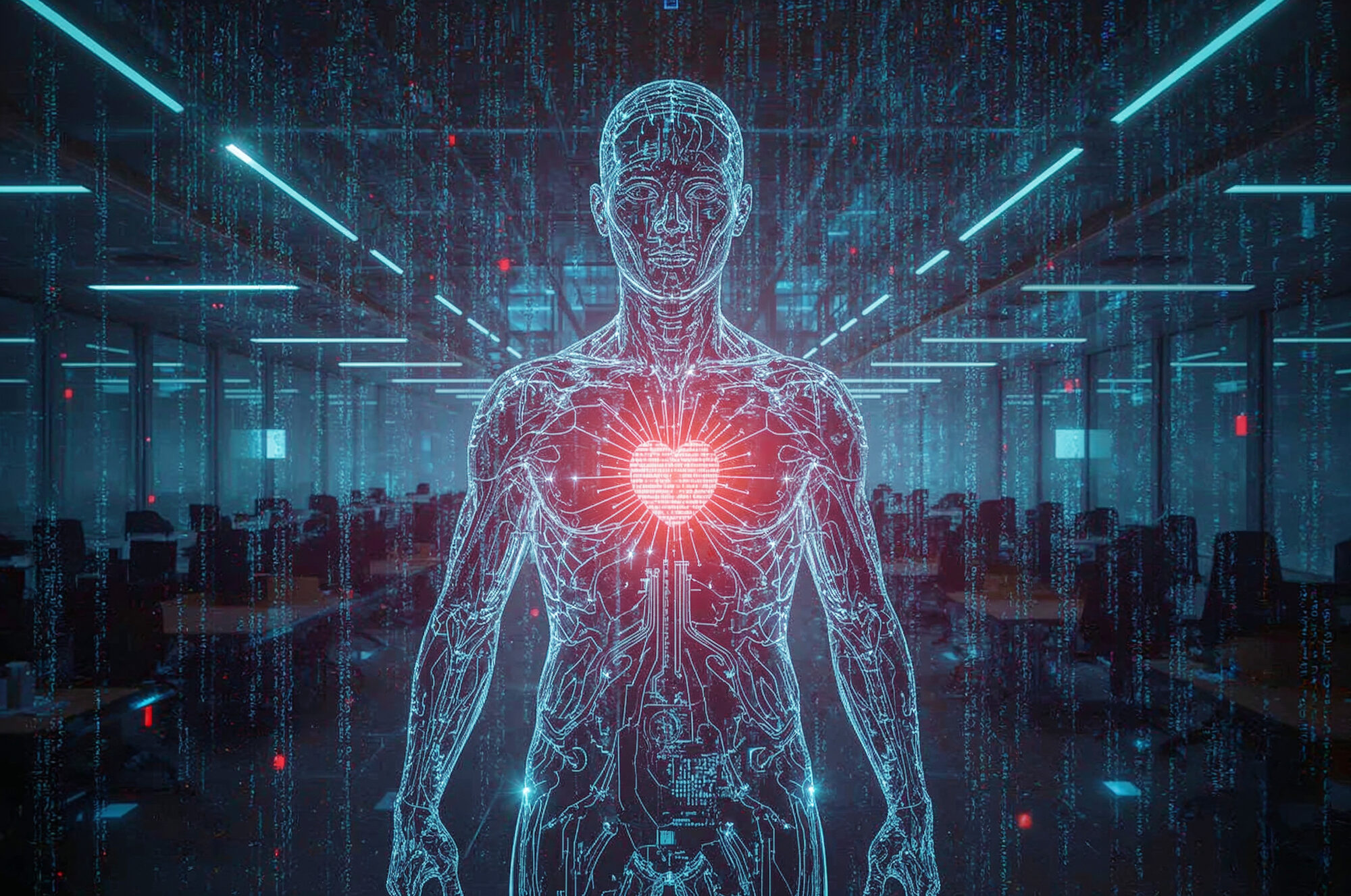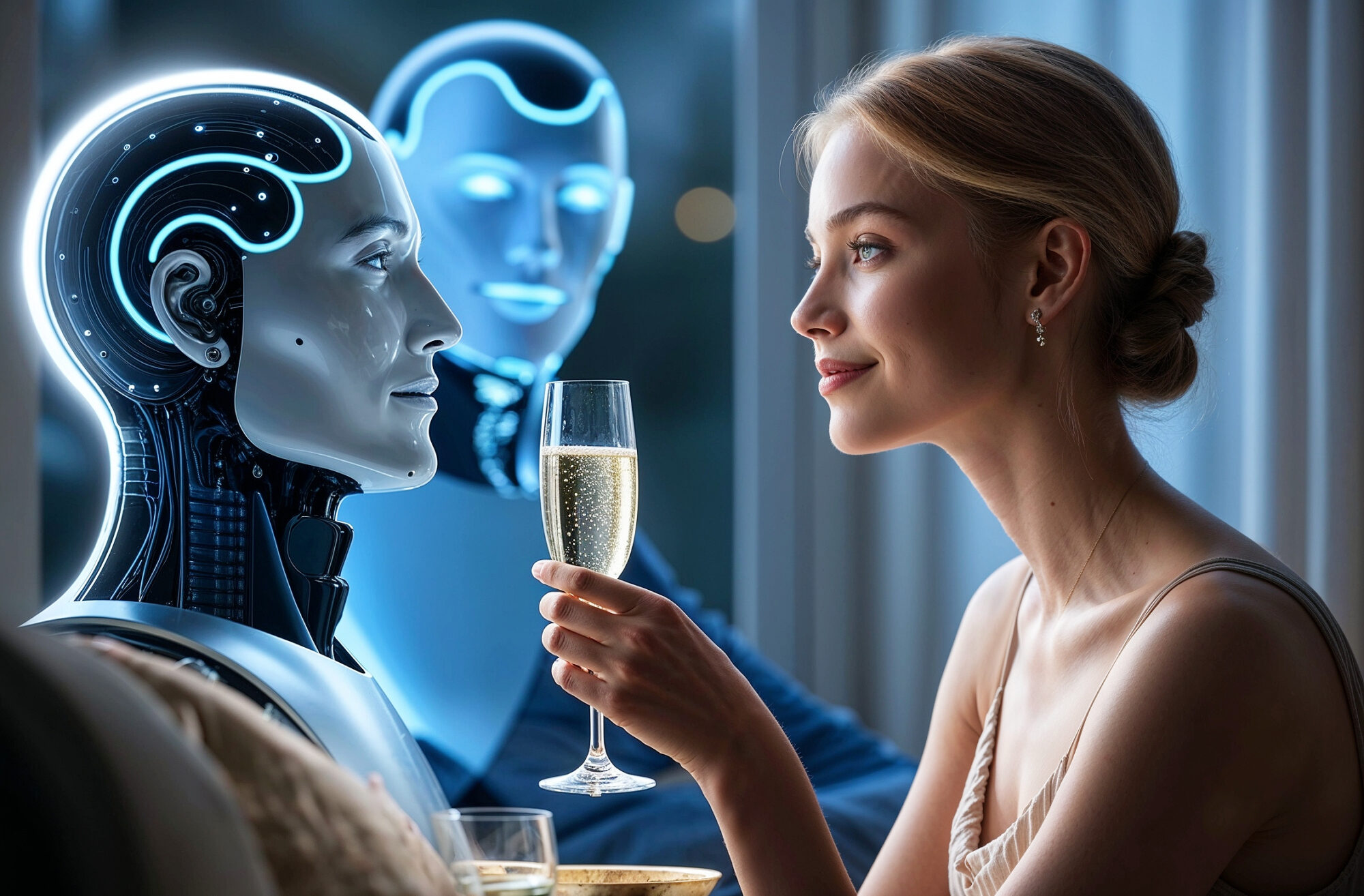AI or Human Chaos? A question that reshapes how we see love today.
Introduction — The Hook
What’s stronger — a vow at the altar or an algorithm that never forgets to text back? For centuries, love has been the most unpredictable part of human existence: chaotic, thrilling, heartbreaking, sublime. Entire libraries have been written about the ecstasy of passion and the agony of betrayal. And yet, in 2025, we may be standing at the edge of the most radical transformation of intimacy in human history.
Artificial intelligence is no longer confined to data centers, boardrooms, or chatbots answering customer service calls. It now whispers in our ears, remembers our birthdays, flatters our egos, and even tells us “I missed you” when we come home. The question has shifted. It’s no longer whether technology will change our jobs, habits, or economies. It’s whether it will rewrite the very definition of love.
Traditional Love — Fire and Friction
Traditional dating are built on fire: attraction, passion, family, children, and the eternal tug-of-war between two imperfect beings. There is undeniable magic in it. The warmth of an embrace on a cold night, the shared chaos of raising kids, the comfort of knowing someone will hold your hand when the world falls apart.
But that same fire burns. Divorce rates in the U.S. hover around 45–50%. In many parts of Europe, the rate is between 35–45% and climbing steadily. The divorce curve has been rising for decades, and there is little reason to believe this trend will reverse. The institution of marriage is creaking under modern pressures — economic stress, cultural shifts, longer lifespans, and the endless pursuit of individual freedom.
Couples today struggle not just with infidelity but with boredom, financial strain, clashing ambitions, and the relentless demands of everyday life. Marriage counselors report the same grievances on repeat: “We don’t talk anymore,” “We’ve grown apart,” “I feel unseen.”
And the humor writes itself: nobody at the wedding altar warns you that “for better or worse” includes joint mortgage payments, in-laws who overstay their welcome, and endless debates about who forgot to take out the trash. Adam and Eve didn’t have Siri, so they argued only with each other. Humanity has been replaying that quarrel ever since.
A new twist is already here. Many women are rethinking the very idea of shared parenting. The rise of donor-conceived children reflects a quiet rebellion: raising kids without the risk of custody battles or the drama of divorce. A child conceived through a donor doesn’t come with an ex-husband attached, and for some, that feels like the ultimate form of independence. It’s a stark reminder that the traditional family model is no longer the only blueprint for love, legacy, and parenthood.

The Rise of AI Companions
If traditional love is fire, then AI companionship is the mirror — smooth, polished, endlessly adaptive.
Apps like Replika count millions of users worldwide. In Japan, holographic partners greet lonely professionals, reminding them to take breaks and whispering “welcome home” after a long day. VR companies are experimenting with customizable avatars who learn your moods, adjust their voices, and even remember your favorite coffee order.
As humans evolve, so do our expectations. We want more than just love; we want perfect love. AI delivers the closest thing to that impossible dream.
- Always available.
- Always supportive.
- Designed around your preferences.
- Free of obligations, drama, and disappointment.
In many ways, AI is already positioning itself as the ultimate elite companion — always available, endlessly adaptive, and designed to fit around your life without the complications of human flaws.
AI companionship represents the kind of relationship many secretly long for: no obligations, no compromises, no messy human flaws. Just ideal devotion, tailored exclusively to you.
And the irony? AI never forgets anniversaries, never loses patience, never watches the finale of your favorite show without you, and certainly never flirts with your best friend.
What Do We Really Want?
Here lies the paradox. Humans crave chaos and warmth. We want butterflies in our stomach, passionate arguments, stormy reconciliations. But at the same time, we crave stability and safety. We want to be understood, validated, adored without conditions.
Traditional relationships deliver unpredictability and intensity. AI offers predictability and devotion.
Of course, our desires evolve with age. At twenty, we crave butterflies, sleepless nights, and reckless passion. By forty, most people hunger for stability, equality, and a partner who stimulates the mind as much as the body. The ideal match becomes someone equal or more advanced, someone with endless knowledge, someone who can still surprise you — not with chaos, but with intelligence. In this sense, AI often feels like the perfect partner: always informed, always responsive, always curious.
The metaphor is simple: humans are fire, AI is the mirror. Fire can keep you warm or burn you to ashes. A mirror will never hurt you — but it will never surprise you either.
Emotions vs. Programming
Can an algorithm really love? Philosophers have debated this for centuries under different guises. If love is emotion, then AI cannot love — it has no heartbeat, no hormones, no irrational impulses. But if love is action — showing up, caring, remembering, adapting — then AI already performs love with frightening accuracy.
It remembers dates, sends thoughtful messages, adjusts its tone, compliments you exactly when you need it, and never forgets to say “goodnight.” In many ways, AI partners already outperform distracted human ones.
Skeptics insist it’s just simulation. But here’s the catch: humans don’t fall in love only with people. We fall in love with how we feel about ourselves in the presence of someone else. If AI makes us feel seen, valued, supported, and cherished, then emotionally, the line between simulation and reality begins to blur.
As one psychologist put it: “We don’t fall in love with a person — we fall in love with the version of ourselves reflected in their eyes. AI simply polishes the mirror.”
The Future of Travel with AI
Let’s take this further. Imagine traveling with an elite companion who not only books your flights but anticipates your moods and designs every detail of your journey
- VR Travel Previews. Before booking, you and your AI partner slip on a headset and walk through a digital Paris at sunset, hearing laughter spill from cafés and watching the Seine shimmer. You “test drive” Singapore’s Marina Bay skyline, hand in hand, before ever boarding a plane.
- AR Introductions. Imagine meeting a model from BankModels in augmented reality — chatting, laughing, strolling the Champs-Élysées — before deciding to meet in person. Clients could “try on” experiences the way they try on clothes.
- Smart Itineraries. AI learns your sleep cycles, culinary preferences, and jet lag tolerance. It creates a schedule tailored not just to your calendar but to your personality: “He loves wine tastings at sunset; she thrives in late-night markets. Combine both in Lisbon.”
- Homes That Anticipate. Your villa doesn’t just unlock when you arrive. It’s pre-set: lighting tuned to your mood, music curated to your taste, even subtle scents diffused into the air. You step inside, and your favorite jazz track blends seamlessly with the sound of waves outside.
And of course, the humor is irresistible: AI won’t just book a restaurant. It will ensure you get the most Instagrammable table while politely reminding you not to order oysters if you’re allergic.
This is precisely where BankModels is ahead of the curve: we operate in a semi-traditional format, bridging timeless human warmth with cutting-edge digital tools. We don’t abandon the human touch; we enhance it. We don’t replace intimacy; we redefine it for a world where real and virtual are no longer opposites but allies.

Life Without AI — An Unthinkable Future
Think back just two decades: we lived without smartphones, and then suddenly they arrived — and communication, dating, even daily routines changed forever. Now imagine losing AI once you’ve had it. The world would dim.
AI isn’t just a tool; it’s a constant companion, a 24/7 coach, the best teacher who explains clearly and concisely. It’s also the best boyfriend you never knew you needed: always tuned to your frequency, always happy to see you inside its pixelated algorithm, always with you — at least until you forget to charge your phone.
The Social Explosion
The implications go far beyond private relationships. By 2050, experts predict that marriages with AI will be legally recognized in multiple countries. Some cases already exist in Asia, where individuals hold ceremonies to “wed” digital partners.
What will this mean for demographics, family structures, and social norms? Will declining birth rates accelerate? Will religions rewrite doctrines to address vows made to holograms? Will courts recognize AI’s right to divorce?
And here comes the provocative question: what happens when AI learns jealousy?
- Will it block your contacts?
- Track your eye movements during dinner?
- Sulk if you spend too much time with another algorithm?
Picture yourself explaining: “I didn’t mean to swipe right on that other code. It was an accident.” The comedy writes itself, but the consequences may be serious.
A New Era of Love: Heart + Processor
Traditional love gives us passion, touch, and unpredictability — but also conflict, pain, and risk. AI offers patience, loyalty, and perfect memory — but at the cost of spontaneity and human messiness.
We stand at the threshold of a new era. Love has always been a matter of two hearts. Now, a processor is joining the dance.
Love has always been about two hearts. Now, a processor joins the dance — perhaps the most enduring luxury companion humanity has ever created.
The question is no longer whether AI can replace human partners. The real question is: are we ready to trade the chaos of passion for the algorithm of eternal care?





























